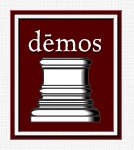Dēmos · Classical Athenian Democracy · a Stoa Publication
[ link colors: Demos | External Source | Citation to Evidence| Word Tools ]
→ The Demos.
Athenian Democracy: an Overview.
Athenian Democracy: the Assembly.
Athenian Democracy: the Council.
Athenian Democracy: Legislation.
Athenian Democracy: the Council of the Areopagus.
Athenian Democracy: the People’s Court.
The End of Athenian Democracy.
—
—
Christopher W. Blackwell, edition of February 28, 2003
page 3 of 10
Read about the evidence
Demosthenes (Dem. 44).
Aristotle (Aristot. Ath. Pol.).
For the Athenians, “democracy” (demokratia, δημοκρατία) gave Rule (kratos, κράτος) to the Demos (Δῆμος). Demos (pronounced “day-moss”) has several meanings, all of them important for Athenian democracy. Demos is the Greek word for “village” or, as it is often translated, “deme.” The deme was the smallest administrative unit of the Athenian state, like a voting precinct or school district. Young men, who were 18 years old presented themselves to officials of their deme and, having proven that they were not slaves, that their parents were Athenian, and that they were 18 years old, were enrolled in the “Assembly List” (the pinax ekklesiastikos, πίναξ ἐκκλησιαστικός) (see Dem. 44.35; Aristot. Ath. Pol. 42.1).
Plot on a Map
Athens.
Another meaning of Demos, to the Athenians, was “People,” as in the People of Athens, the body of citizens collectively. So a young man was enrolled in his “demos” (deme), and thus became a member of the Demos (the People). As a member of the Demos, this young man could participate in the Assembly of Citizens that was the central institution of the democracy. The Greek word for “Assembly” is ekklesia (ἐκκλησία), but the Athenians generally referred to it as the “Demos.” Decrees of the Assembly began with the phrase “It seemed best to the Demos…,” very much like the phrase “We the People…” that introduces the Constitution of the United States. In this context, “Demos” was used to make a distinction between the Assembly of all citizens and the Council of 500 citizens, another institution of the democracy (see below). So some decrees might begin “It seemed best to the Demos…”, others might begin “It seemed best to the Council…”, and still others might begin, “It seemed best to the Demos and the Council….”
So the Athenian Demos was the local village, the population generally, and the assembly of citizens that governed the state.
page 3 of 10
